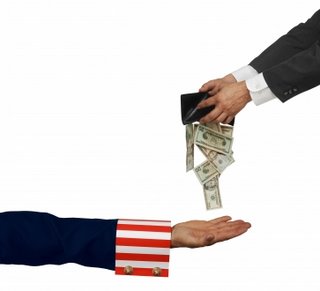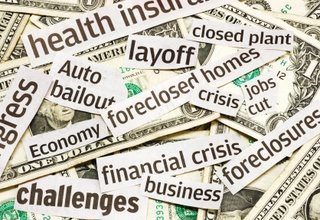Archive for 2009
Friday, January 30th, 2009
 Credit cards and debit cards are handy tools when you want to assure yourself of a room at your vacation destination, a best price on an airline ticket, or a car waiting for you when your flight touches down. Credit cards and debit cards are handy tools when you want to assure yourself of a room at your vacation destination, a best price on an airline ticket, or a car waiting for you when your flight touches down.
But before you whip out just any credit or debit card, be aware of what will happen next, and how it can affect both your cash flow and your credit scores.
When you book a room and give your credit or debit card number, most hotels will immediately check to see that you do have the credit or the funds. That’s reasonable, isn’t it? The next step may also be reasonable, but can be detrimental to you.
Because they want to be assured that they’ll be paid if they hold your room and you turn out to be a “no show,” they then place a “hold” on an amount equal to the expected charges for your stay. If you call and cancel within their specified time frame, they’ll release the money, but meanwhile, it’s as if you’ve already spent it.
Gas stations and rental car agencies use the same practice, and some car rental agencies check your actual credit report each time you rent a car – placing numerous credit score-damaging inquiries in your file.
So be careful. It makes sense to book a room early if you’re traveling to a popular destination, or if you have an opportunity to get a reduced rate on your room or your airline tickets, but choose a little-used credit card – one that you don’t use for day to day purchases. If possible, choose a card with a large credit line, so that your hotel reservation doesn’t use up more than 30% of your available credit.
If you use your debit card, get the exact amount that they’ll hold and write it into your check register as an amount already spent. Otherwise, you could be faced with returned checks, overdraft fees, and a bad stain on your credit report.
Reservation clerks will tell you not to worry – your card won’t be charged unless you fail to show up. Then you’ll have the option to use the card or pay by another means once you get there. And that’s true.
But in the eyes of your banking institution, your credit card issuers, and the credit bureaus who determine your FICO scores, a “hold” is as good as a charge. It reduces your available checking account balance, or reduces your available credit while raising the percentage of credit usage to credit available.
Posted in credit cards | Comments Off
Thursday, January 29th, 2009
 There are some advantages of being self employed, you can write off quite a bit to avoid paying the IRS. You can also find yourself in trouble with the IRS because you were writing off items that may not have existed or just was flat wrong. I am sure if the IRS investigated every self employed individual, the American deficit would probably disappear due to back taxes being owed. There are some advantages of being self employed, you can write off quite a bit to avoid paying the IRS. You can also find yourself in trouble with the IRS because you were writing off items that may not have existed or just was flat wrong. I am sure if the IRS investigated every self employed individual, the American deficit would probably disappear due to back taxes being owed.
A couple of years ago getting loans for individuals that did not show much taxable income on there tax returns was not problem with decent credit scores. Well it is a problem now. It also is a federal crime to state on a mortgage application that you make more than you actually do. This is considered fraud, and was going on all over the United States with various mortgage bankers and brokers.
Currently no matter what your credit score is, you need to show income on your Schedule C tax return in order to qualify for a mortgage. There currently is no market for loans where qualifying income can not be documented. There are however hard money lenders willing to loan money to individuals like this, but those terms are close enough to being classified as loan sharking.
Let’s assume you do show some income on your tax returns, and typically lenders will require the last two years of tax returns for qualifying purposes. What a lender will do is average the last 24 months to determine your income. If you showed $20,000 one year in taxable income and $30,000 the next, your income would be $2083.00 per month. Regardless of whether you actually make $120,000 a year but your tax return shows $2083.00 per month, you will only qualify based on what is actually reported to the IRS.
So in my opinion those who actually make good money and cheat on there tax returns will ultimately cheat themselves out of a loan or qualifying for the mortgage they actually wanted. This applies to someone that has a $1,000,000 in the bank and a 820 fico score, rules are rules in banking.
So this year when you file your taxes and plan on making a home purchase I would re-consider how much you are writing off on your tax returns.
Posted in Uncategorized | Comments Off
Tuesday, January 20th, 2009

Credit card companies once vied for your business by trying to out-do each other in offering rewards. Now they’re responding to the worsening economy but cutting back on rewards programs.
American Express has dropped its offer of free domestic airline tickets to companions of Platinum and Centurion cardholders. In November, Chase cut its cash back rewards program from 3% of the purchase price to 1%. And Discover is now forcing cardholders to return their cash awards of they have a payment more than two months late.
Megan Bramlette, managing associate at the bank consulting company Auriemma Consulting Group, was quoted in USA Today as predicting more and more trimming of credit card benefits.
Some are seeing a drop in overall consumer debt as a good thing – it fell 3.4% in November alone – but this may not have been because Americans wanted to borrow less. It may have been a result of actions taken by the credit card companies:
• Increased interest rates
• Reduced credit limits
Those actions have a snowball effect on consumers. Not only is a smaller amount of their monthly payment going toward paying down principal, the reduced credit limits are reducing their FICO credit scores.
Many consumers wanting new credit cards, car loans, and mortgages are being turned down because their FICO scores no longer fall into acceptable limits – even if they were well above limits a few short months ago.
Credit card companies are running scared in the wake of the financial crisis, and they have come to the realization that many Americans are now broke. In response, some are opting to mitigate their losses by accepting payoffs of less than the original balance – some at 50% or less.
According to a recent report in the New York Times, Bank of America worked with over 700,000 consumers in 2008 – lowering interest charges, dropping fees, and sometimes reducing loan balances.
2009 will be a year of cutbacks and even hardships for many consumers – while presenting opportunities for others. As fewer are able to obtain mortgage loans, and more foreclosures come on the market, home prices should continue to decline. In addition, auto makers are offering loans with little to no interest, just to get those cars moving off the lots. Thus, consumers with high credit scores and money in the bank may be in a position to “choose their bargains.”
Even consumers with no interest in borrowing this year should be working to maintain high credit scores, because no one knows what the future will bring. So don’t wait until you need credit to see what your credit report says.
Not only are the rules changing, so that your score could have dropped without your knowledge, experts say that 25% of all credit reports contain errors that could damage your credit. Get your free credit report with scores today – just to be safe.
Posted in credit card | Comments Off
Monday, January 19th, 2009

Credit card issuers will have to adhere to some new rules by July 2010. That’s a step in the right direction, but could be too late for many consumers. In addition, the new regulations don’t address some of the issues that have angered credit card holders.
One of those issues is customer service. Cardholders are receiving notices in their statements, or in separate pieces of mail that are often mistaken for junk mail. These notices are hard to understand, so they’re calling customer service for help.
But… often the company reps can’t answer their questions. They don’t understand the notices either. Some will give an answer, and then if the consumer calls back, someone else will give a different answer. This is no help for the cardholders.
Consumer advocates are saying “Train your people!” This is especially important when those consumers are getting letters telling them they’re going to be paying more to pay off their debts.
Even more anger is generated by broken promises. Cardholders who have complied with the initial agreement they had with the card issuers are now getting notices that the agreement has changed. Their interest rates have been raised, they’re getting new fees, and their credit limits have been lowered.
This might be understandable if the consumer had been late with payments or had gone over limit. But these notices are also going to people who have held up their end of the bargain. Card issuers are changing the terms of the agreements with no provocation, after consumers are already in debt to them.
When interest rates escalate from 11% up to 19% – or even higher – more consumers have trouble making the monthly payment and of course are taking longer to pay down their debt.
Other consumers report that they had responded to offers urging them to transfer balances from higher rate cards, and would receive a 4.9% interest rate for the life of the transferred balance. They’ve been paying more than the minimum monthly payment, on time, every month. Now, while their interest rate has not been raised, they’re being slapped with a monthly service fee. Technically, it isn’t an increase in interest. But in practice, it is.
Credit card issuers say they are taking these steps to manage their own risk, but they knew when they went into the business of loaning money with no collateral that there would be risk involved. That doesn’t mean they should be able to change the rules after the game has begun.
Interestingly, these risk management moves may backfire. In addition to keeping people in debt longer, these credit card issuers are forcing some to default. Thus their worries about collecting the money owed are becoming reality.
According to the Federal Reserves’ most recent report on consumer credit, Americans have $976 billion in credit card debt, and the card issuers have been making billions in interest, annual fees, late fees, and over limit fees for years.
That makes it pretty difficult for credit card issuers to gain any sympathy from consumers struggling to pay off their credit cards.
Posted in credit cards | Comments Off
Monday, January 19th, 2009
The incidence of identity theft is keeping pace with the credit crisis – as more people’s credit scores shrink, more thieves come out of the woodwork.
Why? Because people whose credit is shot still want to buy things. The dishonest ones have found an easy route to accomplish that – they’ll just use your good credit.
If you learn that you’re a victim, here’s a step by step plan to get your credit back on track and erase the effects of theft.
1. If you get notice from a collection agency, first check to make sure that the agency is on the up and up. Bogus collection notices are a phishing scheme – designed to steal your identity or take money under false pretenses. Google the agency, then call the Better Business Bureau.
2. Contact your local law enforcement and report the theft. Get a case number.
3. Contact the FTC at www.ftc.gov and get the form to fill out. You’ll need to get this notarized. Follow the FTC instructions.
4. Call the FTC ID theft hotline: 1-877-438-4336 to register your name on the national list of victims. Record your reference number.
5. Contact the fraud unit at the collection agency and register a dispute. FAX them a copy of the FTC form and the police report.
6. Contact the credit card issuer or bank involved in the discovered theft. FAX them the documentation. Get your account numbers changed to prevent further use.
7. Contact one of the major credit bureaus to put a fraud alert on your account. The one you contact will pass the information on to the others.
Equifax: 800-525-6285
TransUnion: 800-680-7289
Experian: 888-397-3742
8. Consider putting a freeze on your credit report so that it cannot be accessed without your permission. Reading your report is one way that identity thieves choose their victims. After all, there’s no sense stealing someone’s identity if their credit is no better than your own! They want the “excellent credit identities!”
Note that stealing your actual accounts is not the only method of stealing your identity in use today. Now some thieves are merely stealing your information to print on bogus checks – many of which are not even tied to an actual checking account. It comes back on you because your name and information is printed on the check. The checks are passed using fake ID.
CreditScoreQuick.com
Posted in Uncategorized | Comments Off
Thursday, January 15th, 2009

The Federal Government may be counting on Middle America’s spending to shore up the economy, but it appears that most Americans are not heeding the call. This is a time when we’re saying “Let somebody else do it.”
Americans who have seen friends and family suffer economic devastation due to job loss or illness are finally realizing that it could happen to them. As a result, we’re making major changes – including cutting non-essential purchases and making regular deposits to savings accounts.
In the past few months, we’ve begun paying down debt and putting money aside for a rainy day. In a recent poll, Visa asked more than 1,000 people about their savings intentions and learned that 30 percent are actively saving for a rainy day. Others are saving for retirement (20%), for education (10%) or to purchase a home (8%). While some of these figures may overlap, that indicates that over half of us are now actively saving.
At the same time, some are simply bailing out, opting to take Bankruptcy to get a fresh start. Bankruptcy rates increased by a third from 2007 to 2008 – with 1.06 million consumers filing in 2008.
The most common reasons given for the decision to take bankruptcy are job loss, divorce, unexpected expenses, and significantly overextended credit. For many, there’s no ladder tall enough to help them see over the top.
Some have ended up in this position as a direct result of the risky mortgages they were sold. When the rates adjusted, they were unable to make the payments, so began drawing money from credit cards while putting those houses up for sale. They hoped to get out from under with their credit still intact. Unfortunately, prices began dropping at the same time, so many found that their homes were no longer worth the balance due.
Some attempted short sales – but often it was too little, too late. New plans in place will hope to streamline the process, but until now it could take 8-10 weeks to get approval for a short sale – during which time the foreclosure would have been final or the buyer gone.
Two Bankruptcy options are available:
• Chapter 7, which completely removes all unsecured debt and keeps secured debt.
• Chapter 13, which is a reorganization plan for people with little unsecured debt. Under this plan, participants agree to a repayment plan over 3 to 5 years.
The good news for those filing bankruptcy who want to keep their homes is that Judges will now be able to reduce the balance due – bringing it down to the fair market value of the home.
CreditScoreQuick.com
Posted in economics | Comments Off
Tuesday, January 13th, 2009
-779072.jpg) Credit issues have never concerned the IRS – unless you were trying to deduct interest on personal debt, or you weren’t paying the principal and interest due them on an installment agreement. Credit issues have never concerned the IRS – unless you were trying to deduct interest on personal debt, or you weren’t paying the principal and interest due them on an installment agreement.
But now, in the face of widespread unemployment and consumers’ inability to keep up with monthly obligations, the IRS has moved toward leniency.
In order to help homeowners who are attempting to sell homes that are now worth less than the mortgage balance, the IRS is speeding up the process of moving their tax liens to a different asset. Until now, getting approval from the IRS to complete what is known in the housing industry as a “Short Sale” could take up to 8 weeks. By that time, foreclosure might have been finalized or the buyers gone on to a home they could buy in less time.
In addition, they are going to show more flexibility in helping individuals who are having trouble paying their income taxes.
IRS Commissioner Doug Shulman said he has given instructions to employees to be more understanding in hardship cases. IRS agents will now have grater authority to suspend tax-collection actions in hardship cases. These would include instances in which taxpayers rely on Social Security or welfare income, have lost their employment, or face a serious illness or staggering medical bills.
For those individuals who have agreed to a payment plan to meet their tax obligations, the IRS may now allow a skipped payment or a reduced monthly payment. In the past, such actions would automatically suspend the installment agreement and the IRS would immediately move to attach bank accounts and file liens on property.
One caution: Don’t just miss a payment or send in a lesser amount and expect leniency. If you know you won’t be able to meet an obligation, contact the IRS right away. You’ll have to explain why you are unable to make the payment as agreed.
For taxpayers who are counting on their 2008 tax refund to catch up on other bills, the IRS recommends filing electronically. In addition, choose a direct deposit to your bank account as the method of payment. Both of these choices will put your refund in your hands much faster than filing a paper return and waiting for a check in the mail.
You’ll be able to file your return electronically beginning January 16.
CreditScoreQuick.com
Posted in Uncategorized | Comments Off
Monday, January 12th, 2009
2009 may go down as the year when more Americans resolve to fix their credit than at any time in history – because high scores are now a requisite for getting any kind of decent interest rates.
In fact, without good scores, consumers might not get any loans at all!
Banks are running scared in the face of mass foreclosures and defaults on credit card debt, so want to feel very certain that you’re going to pay them back before they let you have their money.
In response to this need to raise credit scores, bogus credit repair companies are popping up all over. You’ve probably already found them in your in-box or your postal mail box.
But don’t bite.
Unless you’re dealing with a non-profit credit-counseling company who will help you take control of your finances through various kinds of counseling, you’re probably hearing from a scam artist.
Some of the credit repair companies will do one thing for you: they’ll help you remove errors from your credit report. But at a hefty price for something you can do yourself.
Others will take your money and give you no results at all, so your best move is to say “Thanks but no thanks.” Many require payment up front, which is against the law. If you’ve dealt with a credit repair company and paid them before they showed you results, call the FTC at 877-FTC-HELP and report them.
Reading your report and taking action to remove incorrect information is important, and the chance of finding errors is high. In fact, one in four credit reports contain errors. These include data entry errors along with old information that should have been removed after 7 years.
To have incorrect information removed from your file, you must file a dispute with each of the credit bureaus that lists that information. They must then investigate and will report back to you in about 30 days. The business reporting the disputed information must also look into the claim. Then when a mistake is confirmed you can request the credit bureau send a corrected report to any prospective lenders.
Of course it is best to keep a close eye on your credit report so that you have any errors corrected long before you need to show your scores to a prospective lender. Be sure to get a credit report with scores, so you know where you stand.
The way bogus credit repair companies propose to repair your credit is to repeatedly file disputes with the credit reporting bureaus until they get tired of responding and remove the information from your file. Even if this worked, it would take many, many months of repeatedly filing the dispute.
The best plan is to steadily work at paying off that debt.
If you are struggling under a heavy debt load due to job layoffs or illness, do contact your creditors and try to negotiate better terms for repayment. Many will work with you on lowering your interest rate, removing late fees, etc.
If you don’t feel capable of handling these negotiations on your own, check with the National Foundation for Credit Counseling or the Association of Independent Consumer Credit Counseling Agencies to find a reputable credit counselor. Often these services are free.
CreditScoreQuick.com your resource for free credit reports, credit cards, loans, and free credit repair advice.
Posted in credit education | Comments Off
Monday, January 12th, 2009
 The freeze on foreclosure sales and evictions has now been frozen until the end of January, according to a statement issued January 8 by Fannie Mae and Freddie Mac. The freeze on foreclosure sales and evictions has now been frozen until the end of January, according to a statement issued January 8 by Fannie Mae and Freddie Mac.
In an effort to help people avoid losing their homes, Fannie and Freddie began taking part in the Streamlined Modification Program, which allows borrowers to lower their interest rates, extend the life of the loan, or temporarily defer payments on the principal.
Previous announcements had delayed evictions on single-family homes until after the holidays.
The program extends only to those borrowers who use the property as their primary residence, and who have not filed for bankruptcy. To qualify, borrowers must have fallen seriously behind on their mortgage payments – missing 3 or more payments.
Another requirement is proof that the borrower has contacted their lender to try to reach an agreement on modifying the loan. This contact must have been made at least 10 days prior to filing for help under the Streamlined Modification Program.
Citibank has also agreed to a program that would allow judges to reduce mortgage debt for people filing for bankruptcy.
The IRS is also stepping up to the plate to assist.
Since many consumers in trouble with home mortgage payments have also fallen behind on income tax payments, many of the homes in question carry IRS tax liens. Over 600,000 such tax liens are filed each year.
The IRS has vowed to accelerate requests by homeowners to make a federal tax lien secondary to lender liens when a homeowner is refinancing or restructuring a mortgage. By law, tax liens are always take precedence over any other liens.
In the case of a home being sold for less than the value of the mortgage, the IRS will now move the lien to a different property, enabling the transaction to close.
This type of transaction, known as a Short Sale, used to carry severe tax consequences. The balance of the loan that was “forgiven” in order to complete the sale was treated as income for tax purposes.
Now, Under the Mortgage Forgiveness Debt Relief Act of 2007, up to $2 million of the cancelled debt on a principal mortgage is now tax free. This relief applies only to a principal residence, not to second homes or rental income property.
Marte Cliff
Posted in Uncategorized | Comments Off
Sunday, January 11th, 2009
Low credit scores and the difficulty of qualifying for loans may be the cause, since lenders have tightened requirements in the face of massive losses.
Buying a home now calls for a score of 720, and the best rates – now at 5.1% on average – now go to those with a score of 760 or more. Even buying a car requires a good score – with 720 being the ticket to low interest financing on a new car.
With the national average score hovering around 680, most prospective borrowers have some work to do before qualifying.
Or, it could be that consumers have voluntarily changed their spending habits.
Whatever the reason, new figures from the Federal Reserve show that consumers reduced their borrowing by a record $7.94 billion during the month of November. This is the largest dollar-amount drop in the history of record-keeping. It’s also the largest percentage drop since January 1998.
Revolving debt, which includes credit cards, dropped by $2.8 billion while other debt, such as automobile loans, dropped by $5.2 billion. Economist Ken Mayland is quoted as predicting that this reduction will continue well into 2009.
Economists and financial consultants have been advising consumers to cut back on spending for several months – while the government has been urging spending as a way to bolster the sagging economy. In fact, when the stimulus checks were mailed in 2008, welfare recipients were told that they must either “Spend it or lose it.”
And yet, millions of consumers either cannot or will not take on more debt.
Meanwhile, bargains abound for both home buyers and car buyers. The glut of foreclosed properties and short sales has forced prices downward. It’s also swollen the number of homes for sale to a point where many areas have at least a 24 month inventory. (This is determined by dividing the number of homes for sale by the number sold, on average, per month.)
Mortgage lenders lose money every month those “REO” homes are held in inventory, so prices will continue to drop.
Car dealers are also offering bargains, especially on their least popular models. A borrower with a high credit score can get a 0% 36-month loan on some cars, and rates as low as 2.99% on others.
If you’re considering joining the ranks of buyers taking advantage of these bargains, check your credit report and scores before you go shopping. If your scores aren’t quite where they need to be for the best rates, take steps to raise them.
Don’t assume that your scores are fine just because you don’t owe much and you pay all your bills on time. A variety of factors, including data entry errors, can affect your score. Industry experts estimate that approximately 25% of all credit reports contain some kind of error – and many of those are errors that can lower your score.
CreditScoreQuick.com
Posted in consumer debt | Comments Off
Disclaimer: This information has been compiled and provided by CreditScoreQuick.com as an informational service to the public. While our goal is to provide information that will help consumers to manage their credit and debt, this information should not be considered legal advice. Such advice must be specific to the various circumstances of each person's situation, and the general information provided on these pages should not be used as a substitute for the advice of competent legal counsel.

|
 Credit cards and debit cards are handy tools when you want to assure yourself of a room at your vacation destination, a best price on an airline ticket, or a car waiting for you when your flight touches down.
Credit cards and debit cards are handy tools when you want to assure yourself of a room at your vacation destination, a best price on an airline ticket, or a car waiting for you when your flight touches down.






-779072.jpg)

